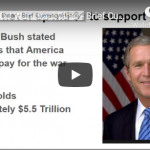GLOBAL
A Currency Drop is Inflationary, Right?
Harvard’s Gopinath Upends Conventional Wisdom at Jackson Hole
The central banker’s task of keeping inflation just right has become a permanent tussle with the global currency markets. Too weak a currency equals too rapid price gains. Too strong, and disinflation looms.
That’s the well-worn argument under the microscope Friday at the Jackson Hole Symposium, the U.S. Federal Reserve’s annual policy getaway. Gita Gopinath, a scholar at Harvard University, says that it just isn’t that simple.
“The greater the fraction of a country’s imports invoiced in a foreign currency, the greater its inflation sensitivity to exchange rate fluctuations at both short and long horizons,” she says. Because the dollar is by far the dominant currency in world trade, “U.S. inflation is consequently more insulated from exchange rate shocks, while other countries are highly sensitive to it.”
USA
Stock market’s bumpy ride isn’t over, experts say
Black(er) Monday Looms: Dow Futures Down 220 After J-Hole Speeches & China Fold
ZeroHedge~Submitted by Tyler Durden on 08/30/2015 18:45 -0400
An ugly start to the week:
With some key Fib support being tested:
China’s government has decided to abandon attempts to boost the stock market through large-scale share purchases, and will instead intensify efforts to find and punish those suspected of “destabilising the market”, according to senior officials.
For two months, a “national team” of state-owned investment funds and institutions has collectively spent about $200bn trying to prop up a market that is still down 37 per cent since its mid-June peak.
…
Traders and officials said the latest intervention was aimed at providing a “positive market environment” in preparation for a big military parade this week to celebrate the 70th anniversary of the “victory of the Chinese people’s war of resistance against Japanese aggression”.
Senior financial regulatory officials insist that this was an anomaly, and that the government will refrain from further large-scale buying of equities.
Finally, for a glimpse at where we might mean-revert to after the biggest 3-day short-squeeze since the bank bailout in Nov 2008…
We are gonna need another AAPL email, stat.
Charts: Bloomberg
After a week like this, market vol is ALWAYS high
Given where we are at the moment, the S&P 500 (INDEX: .SPX) is on track to end the week up less than 1 percent. But that has been anything but the story. Given the intraday highs and lows this week, we have seen a range of 6.7 percent between the two extremes. That’s been the fuller story. So with a week like this-generally “flat” by the end, but with a huge swing along the way-how has the …
Stocks Set for Worst Month Since 2012 as Fed, China Woes Collide
Crude declines following biggest two-day surge since 2009
Chinese shares head lower early as key parade approaches
Asian equities extended the biggest monthly decline in more than three years after Federal Reserve officials signaled they’re prepared to raise interest rates even amid turmoil in Chinese markets. The yen halted a four-day drop, while Australia’s dollar retreated with copper.
Asia’s benchmark share gauge fell with U.S. futures. The Shanghai Composite Index slid even as Chinese authorities seek to stabilize markets before an important military parade this week. Japan’s currency rallied 0.5 percent. The Aussie traded near a six-year low, while copper futures sank.
More than $5 trillion has been erased from the value of global shares in August as concern that China’s economy may be in worse shape than previously estimated collides with investor worry about whether global growth can withstand higher U.S. interest rates. That’s sent prices swinging for everything from equities and oil to havens such as the yen and bonds. Bets on a September Fed liftoff climbed after Vice Chairman Stanley Fischer said there is “good reason” to believe inflation will accelerate.
“We are going to continue to see volatility,” Nader Naeimi, head of dynamic asset allocation at AMP Capital Investors Ltd. in Sydney, which oversees about $118 billion, said by phone. “The Fed is aware of the market volatility and you wouldn’t have thought they would be raising rates into market turmoil. But at the same time, data coming out of the U.S. has been surprisingly resilient and strong. It’s very difficult for the Fed.”
China Arrests
The MSCI All-Country World Index is heading for a 6.5 percent drop in August, the biggest such slump since May 2012. MSCI’s Asia-Pacific gauge dropped 0.8 percent by 11:08 a.m. in Tokyo, headed for an 8.5 percent slide in August, its fourth straight monthly retreat. The Hang Seng China Enterprises Index fell 0.7 percent, taking losses since a May peak to 35 percent.
The Shanghai stock measure fell 3.4 percent amid reports that Chinese authorities are stepping up a crackdown on people engaged in market destabilizing activities. Four executives of Citic Securities Co., the nation’s largest brokerage, a journalist at business magazine Caijing and a staff member at the securities regulator all confessed to crimes, the state-run Xinhua News Agency said.
U.S. Futures
Australia’s S&P/ASX 200 Index fell 0.9 percent as the Kospi index in Seoul lost 0.5 percent.
Standard & Poor’s 500 Index futures slid 1 percent. While Fischer was careful to announce that he wasn’t signaling an impending rate increase, his remarks suggested a move hasn’t been ruled out when the Federal Open Market Committee gathers in Washington Sept. 16-17.
The yen gained 0.5 percent, while the Aussie weakened 0.5 percent. Copper futures due in December slipped 0.9 percent on the Comex. The London Metal Exchange is closed Monday.
West Texas Intermediate crude dropped 1.6 percent to $44.52 a barrel. The contract added toThursday’s 10 percent surge with a 6.3 percent advance on Friday, its steepest two-day jump since 2009.
Data indicating U.S. consumer purchases climbed in July as incomes grew boosted optimism over fuel demand at the end of last week. Brent oil lost 1.7 percent to $49.19 per barrel on Monday after gaining 10 percent last week, the most since March 2009.
CHINA
Crazy like a fox? Whipsaw market may be rational
The stock market has suffered wild swings over the past two weeks, declining sharply before staging a powerful two-day bounce that erased some of the initial losses. Read More The markets were a roller coaster this week The speed of the moves, particularly after a long period of market quiescence, has led some to suggest that the market is dominated by thoughtless ” algos ” (or automated) …
China’s Stocks Slump Amid Confusion Over Level of State Support
August 30, 2015 — 9:31 PM EDT Updated on August 30, 2015 — 10:46 PM EDT
China’s stocks fell for the first time in three days as traders weighed the level of state support.
The Shanghai Composite Index slid 2.5 percent to 3,152.16 at 10:31 a.m. local time. Citic Securities Co. dropped 6.9 percent after Xinhua News Agency reported that company executives were detained on suspicion of insider trading.
Swings in Chinese markets this month have rattled investors worldwide as they struggle to anticipate policy actions in the world’s second-largest economy. Stocks rallied almost 10 percent over Thursdayand Friday on speculation authorities are propping up markets before President Xi Jinping takes the stage at a World War II victory parade this week.
“There is a lot of confusion about purchases of stocks by state-linked funds,” said Gerry Alfonso, a sales trader at Shenwan Hongyuan Group Co. in Shanghai. “Disclosures are very limited so it is impossible to know what they are doing with certainty.”
The government revived its intervention in equities on Thursday to halt the biggest selloff since 1996. The effort to support markets was part of a broader push to ensure nothing detracts from the parade, which the government will use to demonstrate its rising military and political might.
ASIA
Asian Stocks Drop, Extending Biggest Monthly Retreat Since 2012
JAPAN
Japan Stocks Fall, Extending Biggest Monthly Loss Since 2012
http://www.bloomberg.com/news/articles/2015-08-31/japan-stocks-fall-extending-biggest-monthly-loss-since-2012?cmpid=yhoo
Japanese stocks fell, with the Topix index set to cap its biggest monthly loss in more than three years, as comments from Federal Reserve officials renewed speculation the U.S. may raise interest rates as soon as September. U.S. stock futures tumbled after Fed officials meeting in Jackson Hole, Wyoming, said inflation was likely to improve, dousing investor expectations that interest-rate hikes would be delayed until December. At the central bankers’ annual meeting, Fed Vice Chairman Stanley Fischer said inflation is poised to move higher.




















